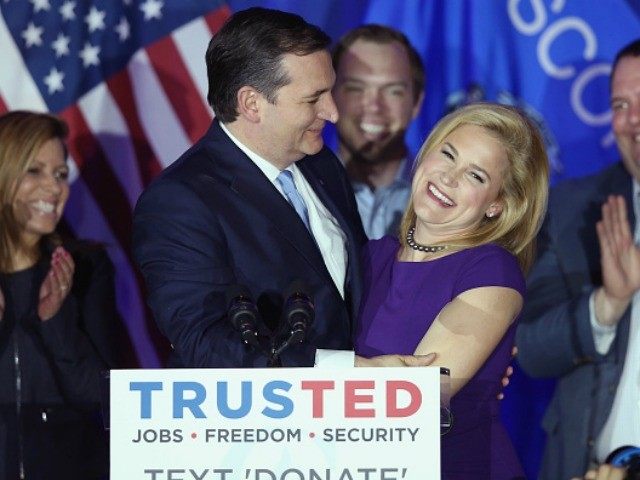Most pundits expected Ted Cruz to win the Wisconsin primary, and the RealClearPolitics average of polls showed him ahead in the Badger State by 4.7 points.
While some polls showed Cruz leading Donald Trump by 10 points, the Texas Senator won the state by a larger than expected 15 points. When the final votes are counted, Cruz will be likely just shy of winning 50 percent of the vote.
It is easy to forget, but at the beginning of March, Trump held a 10 point lead in Wisconsin over second-place Marco Rubio. Ted Cruz was third with 19 percent of the vote. In the weeks that followed, Trump won most of the contests on both Super Tuesday and Big Tuesday on March 15.
After losing his home state of Florida on March 15, Sen. Marco Rubio dropped out of the primary. The contest for the Republican nomination looked to be all but over. After the Wisconsin results, it looks like the nomination fight will go on until the floor of the RNC convention in July.
At the beginning of March, Trump had the support of 30 percent of Republican voters in Wisconsin. On election night April 5, he received 34 percent of the vote, even though two major challengers, Marco Rubio and Ben Carson, bowed out after that early poll. In other words, even though the Republican contest went from 5 candidates to 3, Trump only grew his support in Wisconsin by 4 points.
Trump’s share of the vote in Wisconsin, in fact, was just a little bit lower than his share of the vote in neighboring Illinois and Michigan, two states he won, even though there were fewer candidates in the race in Wisconsin. Cruz, however, dramatically increased his vote in Wisconsin compared to those states. Trump is unique among past frontrunners. He doesn’t gain support as candidates leave the race.
Trump’s failure to grow his support is only part of the story in Wisconsin, though. The more meaningful story is the complete dominance of Ted Cruz on election night. At the beginning of March, Cruz had just 19 percent support in Wisconsin. In a matter of weeks, he increased his support by around 30 points.
John Kasich, whom many pundits predicted could run strong in Wisconsin, wasn’t a factor. He only drew 14 percent of the vote, 6 points below his support in polls. If, against all political logic, Kasich’s vote had been added to Trump’s, the combined total would still have fallen short of Cruz’s final vote.
Cruz was obviously helped by the endorsement of Gov. Scott Walker. Cruz won decisive victories in the counties surrounding Milwaukee, Walker’s political base. Trump certainly made a miscalculation by attacking Walker on the campaign trail for not raising taxes as Governor.
In his victory, though, Cruz didn’t just consolidate voters opposed to Trump. He made serious inroads into voting blocks and groups that have supported Trump throughout the primary contests.
According to exit polls, Cruz beat Trump by 6 points among voters with a high school education or less. Cruz beat Trump by 10 points among voters who didn’t have a college degree. Cruz also edged Trump among voters making less than $50,000 a year. These voters, lower income with less education, had previously been among the core voting blocks for Trump.
Cruz crushed Trump by 21 points among evangelical Christians, a group Trump had previously won, but had long been considered Cruz’s natural base. Cruz, however, also won non-evangelicals by 7 points. Cruz winning non-evangelical, blue-collar voters in the Midwest has not been in any strategists’ playbook.
Cruz also won on every major issue category. For voters who thought the economy was most important, Cruz beat Trump by 16 points. Voters most worried about terrorism picked Cruz over Trump by 14 points. Those most concerned about government spending selected Cruz over Trump by 17 points.
Only 6 percent of Republican voters said immigration was their top issue. This number was too small, in fact, to provide a breakdown of their voting preference in exit polls.
Perhaps the most interesting take-away from the exit polls was voters’ perceptions of the general election. Just 11 percent of Republicans said the most important quality they were looking for in a candidate was the ability to win in November. Cruz won 68 percent of these voters, 48 points more than Donald Trump.
When asked how they would feel if Ted Cruz were elected President, 37 percent of Wisconsin Republicans said they would be “concerned” or “scared.” Asked the same about John Kasich, 47 percent said they would be “concerned” or “scared.”
And, Donald Trump? Almost 60 percent of Republicans said they would be “concerned” or “scared” if the GOP frontrunner were elected President. Just 41 percent of Republicans said they would be “excited” or “optimistic” about the prospect of a Trump Presidency.
That is probably the biggest challenge facing Donald Trump in his quest for the White House. He still has a formidable lead in delegates and the primary contest turns next to the Northeast and Mid-Atlantic where he has performed well this year.
None of those states, however, are competitive in a general election. Wisconsin, however, is a perrenial swing state in Presidential contests. Its voters are exactly the kinds of voters Trump will have to win over in November. Cruz broke through with these voters in a place he wasn’t supposed to do well. Trump failed to do so, even though he began the contest with a solid lead.
In short, Cruz fought back from a losing position. Trump has yet to show he can do that.

COMMENTS
Please let us know if you're having issues with commenting.